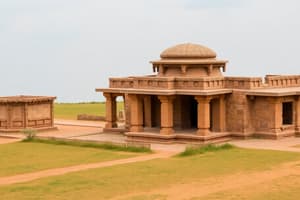Podcast
Questions and Answers
What is one of the key features of the Indus Valley Civilization's urban settlements?
What is one of the key features of the Indus Valley Civilization's urban settlements?
- Lack of trade networks
- Nomadic lifestyle
- Randomly constructed dwellings
- Highly organized urban settlements (correct)
What did the standardized weights discovered from the Indus Valley Civilization suggest?
What did the standardized weights discovered from the Indus Valley Civilization suggest?
- Chaotic trade practices
- Barter system
- No economy existed
- A regulated economy (correct)
What is one significance of the Indus Valley Civilization's script that remains undeciphered?
What is one significance of the Indus Valley Civilization's script that remains undeciphered?
- Written form of an oral tradition
- It is an encrypted form of modern English
- Used for accounting purposes only
- It is believed to have been used to write a language similar to Sanskrit (correct)
What do advanced craft technologies, such as pottery, seals, and jewelry, indicate about the Indus Valley Civilization?
What do advanced craft technologies, such as pottery, seals, and jewelry, indicate about the Indus Valley Civilization?
Which region did the Indus Valley Civilization primarily cover?
Which region did the Indus Valley Civilization primarily cover?
What is one aspect that hints at a sophisticated spiritual and cultural worldview of the Indus Valley Civilization?
What is one aspect that hints at a sophisticated spiritual and cultural worldview of the Indus Valley Civilization?
Flashcards are hidden until you start studying
Study Notes
The Indus Valley Civilization: A Foundational Chapter of Indian History
Around two million years ago, our human story began to unfold across the vast landscape of South Asia. But it was around 3000 BCE, during the dawn of the Indus Valley Civilization, that India's cultural and political landscape truly began to take shape.
The Indus Valley Civilization, which stretched from present-day western Pakistan to northwestern India, featured highly organized urban settlements, advanced trade and communication networks, and a still-undeciphered script that hints at a sophisticated spiritual and cultural worldview.
Settlements and Urban Planning
The peoples of the Indus Valley Civilization were already living in planned urban developments by 2600 BCE. These settlements covered a 650,000 square kilometer region, demonstrating their widespread influence.
Standardized Weights and Craft Technologies
The Indus Valley Civilization left behind standardized weights, suggesting a regulated economy. They also employed advanced craft technologies, as evidenced by their pottery, seals, and jewelry.
Script and Language
While the Indus Valley Civilization's script remains undeciphered, it is believed to have been used to write a language that was likely the ancestor of Sanskrit, a language that would eventually influence the development of Hinduism. This script, along with the civilization's standardized weights, suggests a literate and sophisticated society.
Decline and Aftermath
The Indus Valley Civilization's decline, in the early centuries of the second millennium BCE, is attributed to environmental changes in the region. Indo-Aryan culture, which would become the dominant force on the subcontinent, began to emerge around 1500 BCE.
The Indus Valley Civilization's Legacy
The Indus Valley Civilization's legacy can be traced to the development of Indian civilization from around 1500 BCE to 1200 CE. It also played a key role in the rise of Hinduism, as well as Buddhism and Jainism, which were founded around the same time. The Indus Valley Civilization's influence continues to be felt in contemporary Indian culture.
Studying That Suits You
Use AI to generate personalized quizzes and flashcards to suit your learning preferences.




